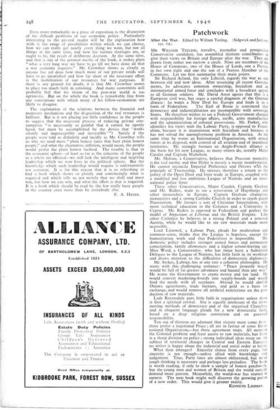Patchwork
MR. WILLIAM TEELING, trayell-i, journalist and prospective Conservative candidate, has assembled thirteen contributors to give their views on Britain and Europe after the war. They are drawn from rather too narrow a circle. Nine are members of the House of Commons, two of the House of Lords, one a Peeress in her own right and one the son of a Peeress Member of the Commons. Let me first summarise their main points.
Sir Richard Acland, the only Liberal, regards the war as one between old and new ideas. After trouncing all recent Govern- ments, he advocates common ownership, Socialism and an international armed force and concludes with a broadcast appeal to all German soldiers. Mr. David Astor agrees that this is a European civil war, but urges a careful diagnosis of the German disease: he wants a New Deal for Europe and finds it in a
form of Federalism. The Earl of Rosse is convinced that democracy and industrialisation are incompatible with sovereign States. He therefore wishes to see a Federal Government charged with responsibility for foreign affairs, tariffs, arms manufacture and the administration of colonial possessions. Mr. Parker, who identifies his views with the Labour Party, is opposed to Feaer- alism, because it is inconsistent with Socialism and because it has not solved the unemployment problem in America. At the same time he wants an International Organisation, with armed forces at its disposal, with control of all aviation and of mandated territories. He strongly favours an Anglo-French affiance as the basis for his new League, as many others do, notably Major Cazalet and Captain Nicholson.
Mr. Molson, a Conservative, believes that Prussian mentality is the real enemy and that Hitler is merely a recent manifestation, He cannot reconcile Imperial Preference and Ottawa with the principle of Trusteeship. He stresses therefore a return to the policy of the Open Door and freer trade in Europe, coupled with a modified and less ambitious League of Nations and an inter- national police force.
Three other Conservatives, Major Cazalet, Captain Graham and Mr. Raikes, want to see a restoration of Hapsburgs and other monarchies in Europe. Captain Graham champions monarchies and a strong Catholic Church in order to crush pagan Prussianism. He favours a sort of Christian Imperialism, with more technical education in the Colonies and a University in Cyprus. Mr. Raikes is opposed to Federalism and prefers the model of Imperium et Libertas and the British Empire. Like other Catholics he believes in a strong Poland and a restored Austria, while he would like to see raw materials made more accessible.
Lord Listowel, a Labour Peer, pleads for moderation and common-sense, thinks that the League is hopeless, except for humanitarian work and that Federalism is impossible. His domestic policy includes stronger armed forces and permanent conscription, family allowances and a higher school-leaving age. Miss Ward, a Conservative. who has twice been a Substitute Delegate to the League of Nations, has little faith in its workings and draws attention to the difficulties of democratic diplomacy.
Mr. Stokes, Labour, has at any rate a coherent philosophy. He starts with this challenging sentence: " Peace properly waged would be full of far greater adventure and hazard than any war." He wants the Government to create money and tax land. He would convert marketing-boards into supply-boards and would feed the needy with all surpluses. Abroad he would abolish Ottawa agreements, trade barriers, and gold as a basis for exchange, and would remove all artificial restrictions on the pro- duction of raw materials.
Lady Ravensdale puts little faith in organisations unless there is first a spiritual revival. She is equally intolerant of the slow- moving methods of democracy and of the organised Churches, and in eloquent language pleads for. a new democratic faith, based on a deep religious conviction and on personal responsibility.
Ten out of thirteen are adamant that victory must come first: three prefer a negotiated Peace ; all are in favour of some Inter- national Organisation,—but there agreement stops. All merman the Colonial problem and freer access to raw materials, but there is a sharp division on policy ; strong individual ideas recur on the subject of territorial changes in Central and Eastern Europe ; no writer is happy about the industrial and social order at home. What then emerges? Sincerity shines from every page, but sincerity is not enough—unless allied with knowledge and judgement. True, Party lines are almost obliterated, but more tough thinking is necessary and perhaps less prejudice. The book
is worth reading, if only to show a sample of honest patchwork, but the young men and women of Britain and the world outside demand more pattern. Meanwhile, the world-war has started in earnest. The next book might well discover the growing points of a new order. This would give it greater reality.
KENNETH LINDSAY.


























 Previous page
Previous page